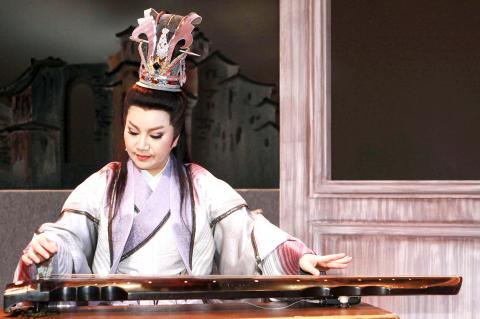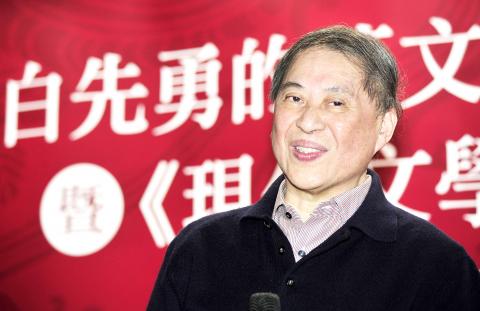In the upcoming theatrical adaptation of renowned writer Pai Hsien-yung’s popular novel Crystal Boys (Niezi, or “sons of sin” in Chinese), director Tsao Jui-yuan has invited the well-known Taiwanese gezaixi opera singer Tang Mei-yun to play the important role of Yang Chin-hai (Mob Boss Yang), which in the theatrical version transforms the elderly homosexual man into a gay female mob boss-like character.
Tang says that this is her first time to play the role of a gay woman. “In the play, I’m a totally different sort of woman. I exhibit motherly love and am willing to protect these youths, so it really becomes an alternative sort of family that has more diversity.” Back in the days when her father performed gezaixi on outdoor stages, there were always women playing gender-neutral roles, she says. “They were precisely the sort of role I’m playing now, with my hair slicked back, wearing a suit, but my father always told me to call those women ‘auntie’ so they would give me gifts.” This image and memory gradually resurfaces in her mind during every rehearsal.
Pai also says that he supports gay marriage and does not beat around the bush about it either, “Homosexuality is a part of humanity. People are striving to have this fact recognized, and if it is finally recognized it means that this country admits that heterosexuals and homosexuals are equal.”

Photo courtesy of Formosa Television
照片由民間民視公司提供
How do you give audiences a novel theatrical experience of Crystal Boys? Tsao says that Pai’s original novel is profoundly meaningful and worth reading repeatedly. Pai says that this theatrical version of Crystal Boys is the second time that the novel has been adapted. “I have the easiest job on the entire team,” Pai says. Apart from Tang being a major source of attraction, Golden Bell Awards winner Ting Chiang, veteran actors Samantha Ko and Fan Kuang-yao, along with renowned idol-actors Mo Tzu-yi and Matt Wu will also be joined by a dance troupe consisting of 17 male dancers, who serve as a key part of the performance and are meant to bring out the joys and tribulations of young homosexual boys trapped in the darkness of an unaccepting society.
The stage adaptation of Crystal Boys will be performed at the National Theater from Feb. 7 to Feb. 16 next year.
(Liberty Times, Translated by Kyle Jeffcoat)
將知名作家白先勇同志經典小說《孽子》搬上舞台劇,導演曹瑞原邀約歌仔戲小生唐美雲詮釋原著中重要人物楊金海(楊教頭),在劇中,這個角色從一位老同性戀變成了大姊頭般的女同性戀者。

Photo: Chen Yi-chuan, Liberty Times
照片:自由時報記者陳奕全
唐美雲說,這是她第一次出飾女同性戀,「戲中我是另外一種女性,有母愛,願意庇護這些小青春鳥,這不正是另外一種多元成家。」唐美雲表示,在她父親演出歌仔外台戲的年代,都會有一些打扮中性的女性,「就是我今天這身打扮,梳油頭,穿西裝,但我父親都教我喊阿姑,喊了才有紅包可以拿。」這個記憶,逐漸回到唐美雲每次的排戲之中,成了內在的形象。
白先勇也說支持同性婚姻,白先勇毫不避諱,「同性戀也是人性的一部分,爭取同志的人性被承認,如果承認,這才表示這個國家承認異性戀、同性戀都平等。」
要如何給觀眾全新的《孽子》舞台印象,曹瑞原說,白老師的原著就充滿深意,值得一再觸碰,白先勇則說,《孽子》舞台劇版已經是二度詮釋,「我是這團隊角色中最輕鬆的一位。」這次除了唐美雲是爆點之外,金鐘影帝丁強、影后柯淑勤、影帝樊光耀;還有實力派偶像演員莫子儀和吳中天,十七位焦點舞團男舞者則將帶來隱身於黑暗王國青春鳥群的悲歡年華。
舞台劇《孽子》明年二月七日起演出,直到二月十六日。地點在國家劇院。
(自由時報記者趙靜瑜)

In an effort to fight phone scams, British mobile phone company O2 has introduced Daisy, an AI designed to engage phone con artists in time-wasting conversations. Daisy is portrayed as a kindly British granny, exploiting scammers’ tendency to target the elderly. Her voice, based on a real grandmother’s for authenticity, adds to her credibility in the role. “O2” has distributed several dedicated phone numbers online to direct scammers to Daisy instead of actual customers. When Daisy receives a call, she translates the scammers’ spoken words into text and then responds to them accordingly through a text-to-speech system. Remarkably, Daisy

Bilingual Story is a fictionalized account. 雙語故事部分內容純屬虛構。 Emma had reviewed 41 resumes that morning. While the ATS screened out 288 unqualified, she screened for AI slop. She could spot it a mile away. She muttered AI buzzwords like curses under her breath. “Team player.” “Results-driven.” “Stakeholder alignment.” “Leveraging core competencies.” Each resume reeked of AI modeling: a cemetery of cliches, tombstones of personality. AI wasn’t just changing hiring. It was draining the humanity from it. Then she found it: a plain PDF cover letter. No template. No design flourishes. The first line read: “I once tried to automate my

Every May 1, Hawaii comes alive with Lei Day, a festival celebrating the rich culture and spirit of the islands. Initiated in 1927 by the poet Don Blanding, Lei Day began as a tribute to the Hawaiian custom of making and wearing leis. The idea was quickly adopted and officially recognized as a holiday in 1929, and leis have since become a symbol of local pride and cultural preservation. In Hawaiian culture, leis are more than decorative garlands made from flowers, shells or feathers. For Hawaiians, giving a lei is as natural as saying “aloha.” It shows love and

1. 他走出門,左右看一下,就過了馬路。 ˇ He walked outside, looked left and right, and crossed the road. χ He walked outside and looked left and right, crossed the road. 註︰並列連接詞 and 在這句中連接三個述語。一般的結構是 x, y, and z。x and y and z 是加強語氣的結構,x and y, z 則不可以。 2. 他們知道自己的弱點以及如何趕上其他競爭者。 ˇ They saw where their weak points lay and how they could catch up with the other competitors. χ They saw where their weak points lay and how to catch up with the other competitors. 註:and 一般連接同等成分,結構相等的單詞、片語或子句。誤句中 and 的前面是子句,後面是不定詞片語,不能用 and 連接,必須把不定詞片語改為子句,and 前後的結構才相等。 3. 她坐上計程車,直接到機場。 ˇ She took a cab, which took her straight to the airport. ˇ She took a cab and it took her straight